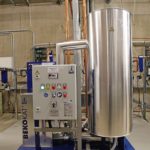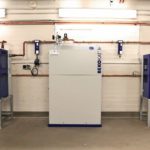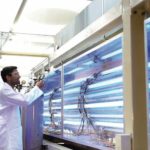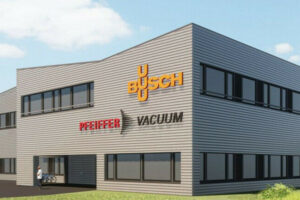The University of Wuppertal operates six compressed air stations with oil-lubricated screw compressors to supply the buildings on campus, including its laboratory facilities. From these stations, a large compressed air network is fed that extends over the entire area of the university. To ensure that the high-quality laboratory equipment remains undamaged and the sometimes very sensitive long-term measurements of the faculties are not affected, the compressed air must be absolutely oil-free and also dry. Each of the six compressed air stations has its own treatment line. The laboratories still use an additional final station filtration and/or drying for special requirements.
Customised treatment concept
Compressed air treatment of the six compressed air stations used to be provided by a refrigeration dryer and double filtration in each case. “After an oil contamination occurred in one of the less sensitive laboratory facilities with fortunately benign consequences, we wanted to proactively increase safety and optimise the complete treatment,” reports Joachim Conrad from the Technical Facility Management of the University of Wuppertal. Now, catalytic technology predestined for sensitive applications was to be used, which surpasses conventional systems for oil-free compressed air, such as the use of oil-free compressors or activated carbon, in terms of effectiveness. Following an on-site analysis, Joachim Conrad and Beko Technologies designed a customised treatment concept for the six compressed air stations. The university initially wanted to procure the treatment technology for two compressed air stations where the most urgent need for action was seen due to their typology. Following a public tender, the Beko Technologies components went into operation in April 2019.
In the two modernised compressed air stations, the treatment follows the same pattern. After the oil-lubricated compressors, a Clearpoint W water separator with the highest separation rates is installed in each case. This is followed by a Drypoint RA refrigeration dryer, which was the only component already integrated in the old treatment system. In the Drypoint RA refrigeration dryer series, the pressure drop was reduced to an absolute minimum for energy efficiency reasons. Key elements here are the flow-optimised heat exchanger, a demister for reliable separation, and generously dimensioned components that ensure a low pressure drop of 0.16 bar on average in full-load operation. Subsequently, a Clearpoint 3Eco fine filtration unit achieves above-average separation performance in an energy-saving manner with minimum differential pressure.
Catalytic converter
The heart of the new compressed air treatment system is the Bekokat catalytic converter. The system converts the hydrocarbons present in the compressed air into carbon dioxide and water in a single process step by total oxidation. To do this, a special granulate is heated to a temperature of around 150 °C in the pressure vessel and the compressed air flowing past the surface of the granulate is completely converted to carbon dioxide and water. Completely de-oiled and germ-free compressed air emerges from the Bekokat the condensate produced when the compressed air is cooled down after the converter is also oil-free and can be discharged into the sewage system without treatment. An integrated heat exchanger ensures maximum energy efficiency. Downstream of the Bekokat are an oil-free dust filter type Clearpoint 3Eco and an oil-free cleaned refrigeration dryer Drypoint RA for a constant moisture level below 5.95 g/m³ water content. The treatment is completed by an oil-free ultra-fine filter of the Clearpoint 3Eco series for filtering out particles down to 0.01 µm.
Thanks to the new treatment process, the University of Wuppertal achieves consistently oil-free compressed air with a maximum residual oil content of a barely measurable 0.003 mg/m³. In addition, the compressed air processed for the laboratories is sterile. Compressed air class 1.4.1 according to ISO8573-1 and the sterility of the air are confirmed by TÜV Nord and a validation certificate and can be re-measured temporarily and stationarily at any time.
The additional decentralised compressed air treatment systems in the laboratories are still in use because the contamination that used to build up in the pipelines of the compressed air network is only slowly degrading. However, the replacement intervals of the filter inserts will be significantly extended, which will reduce maintenance costs.
More process reliability
“The good experience with the Beko Technologies systems prompted us to immediately implement the renewal of the other four compressed air stations,” says Joachim Conrad. In August 2020, these treatment systems were also installed, thus fully completing the designed project. Joachim Conrad sums up: “The catalytic process with Bekokat offers our laboratories the greatest protection against oil in the compressed air. By investing in the new equipment, we increase process reliability and avoid high costs that even a single fault at a sensitive point in the laboratories would cause. ”
Beko Technologies GmbH, Neuss










